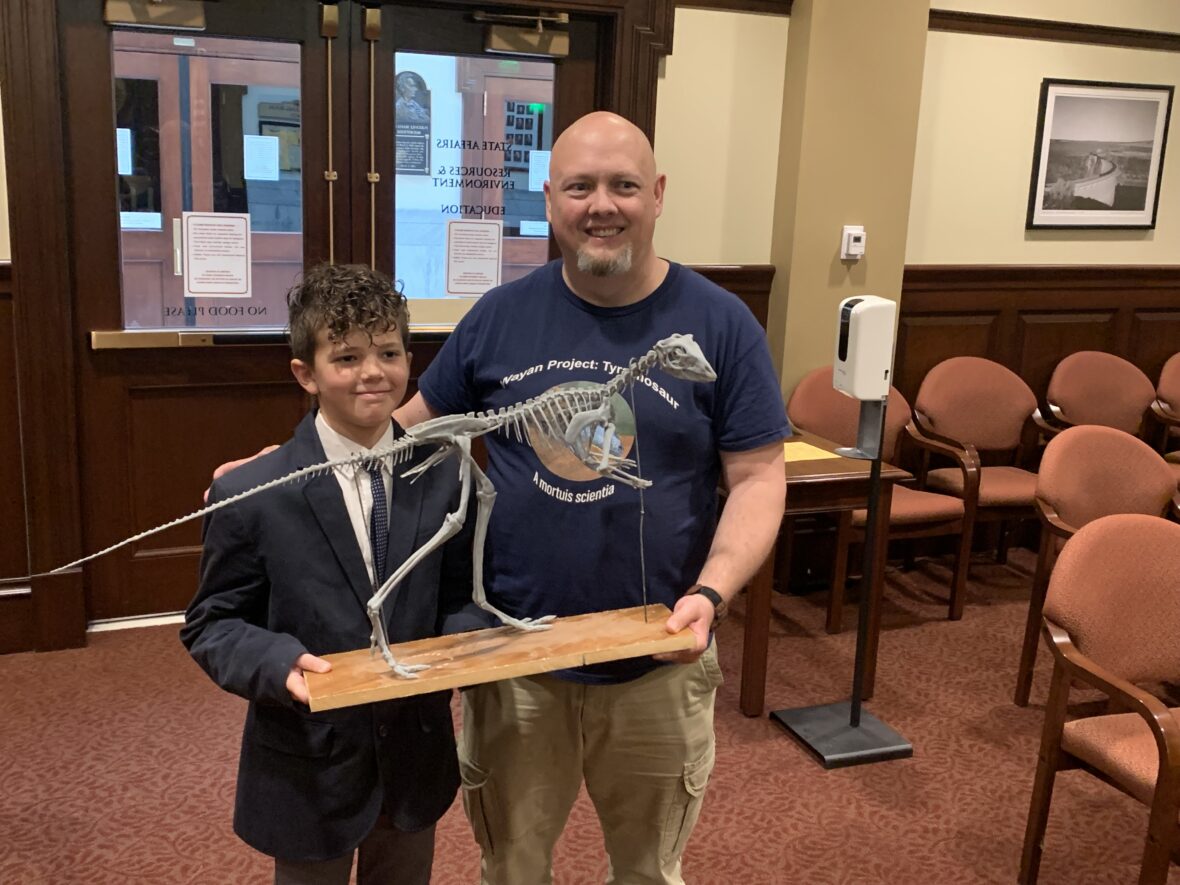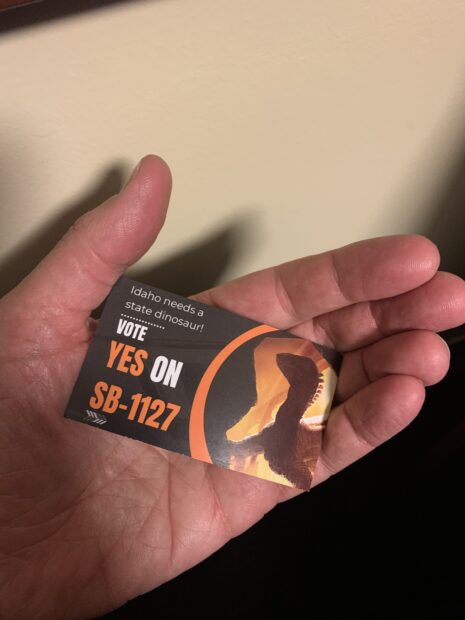
Idaho’s most powerful senators were no match on Friday morning for a 95 million-year-old dinosaur and a bunch of persuasive fourth-graders.
The leadership-heavy Senate State Affairs Committee endorsed a student-led push for a state dinosaur designation — recognizing an Idaho native.
The dino of the moment is the oryctodromeus. Measuring about 12 feet long, but more tail than torso, the oryctodromeus dined mainly on vegetation and dug out family-sized burrows. Its fossils have been found almost exclusively in eastern Idaho’s Fremont County and a sliver of Montana.
In fact, a full oryctodromeus skeleton has been found only in Idaho.
“That is cool,” said Levi Herway, a fourth-grader from Idaho Falls’ Edgemont Gardens Elementary School, who came to the committee room armed with a checklist of arguments for the oryctodomeus.
Herway had plenty of backup.
Taking virtual testimony, the committee heard from a class full of fourth-graders from Eastern Idaho’s Ucon Elementary School. The class had two minutes to testify, and designated three spokespersons — leaving teacher Joel Walton the tough job of choosing from a field of 30 willing volunteers.
“You do not want to be me this day,” Walton quipped.
Friday’s committee hearing spotlighted both the oryctodromeus and the students who championed it.

L.J. Krumenacker, a professor at Idaho State University and the College of Eastern Idaho, allowed that the burrowing, family-oriented oryctodromeus is “pretty stinking unique.” But the students’ campaign is special as well, he said. Many kids might outgrow their love of dinosaurs — but some will pursue other careers in the sciences, and others might go into teaching.
The bill’s Senate sponsor, Idaho Falls Republican Kevin Cook, said he’s never been lobbied harder on a bill.
“This has really been a fun experience for us,” he told the committee. “You saw the kids, you saw Levi. That’s what our education is turning out.”
Friday’s vote was unsurprising and unanimous, but committee Chairman Jim Guthrie adhered to protocol and asked if any senators were opposed.
“I didn’t think there would be,” said Guthrie, R-McCammon.
Senate Bill 1127 next goes to the Senate floor for a vote.
New property tax bill presents trade-off to school districts
A $355 million property tax bill, introduced in the House Revenue and Taxation Committee Thursday, presents a tradeoff to school districts.
Part of the tax bill would impact school facilities funding.
House Bill 292 would divide $100 million between districts, based on average daily attendance. The bill outlines, in order of priority, eligible uses for the money:
- Paying off existing school bonds.
- Paying off existing school levies.
- Saving for future facilities needs.
- Use for new bonds.
School districts currently rely almost entirely on school bonds and levies to build school facilities, placing a heavy burden on local taxpayers. And with property taxes on the rise, patrons in some districts are reluctant to pass the measures, leaving districts to get creative with how they manage overcrowding, and dilapidated buildings.
HB 292 seeks to reduce the burden on taxpayers by subsidizing school bonds and levies.
But it would also eliminate the March school election date — by far the most widely used by districts. A record $1 billion will be on the ballot in this year’s March election.
The March election was established to give districts time to plan their budgets, which must be submitted by June of each year. Many districts feel that the May election cuts it too close. And by the time the August election rolls around, most districts are already in session.
This isn’t the first attempt this session to eliminate school election dates. Another bill, House Bill 58, seeks to remove both interim election dates. But it was sent to the amending order by the Senate State Affairs Committee, after education organizations testified about the importance of the March election date.
And those same organizations have already spoken against HB 292’s attempt to eliminate the March election.
A letter from the Idaho Association of School Administrators, Idaho School Boards Association and Idaho Education Association reluctantly offers up the August date instead.
“No school leader runs a tax levy for fun – they do it because they must maintain operations or update and build new facilities to meet the needs of their students,” the letter reads.
“We maintain that all dates are necessary for schools, especially as even this bill is still far from meeting the state’s school facility needs. However, if a date must go, we respectfully request the Legislature remove the August election date, which is less consequential to maintaining regular operations of our public schools.”
HB 292 will return to the House Revenue and Taxation Committee on Monday, for a committee hearing.
Another ESA bill introduced
Senate State Affairs printed yet another version of an education savings accounts bill.
Like its predecessors, this bill would siphon $12 million from the proposed, permanent $30 million-a-year Empowering Parents education grant program.
The $12 million would fund a private school tuition pilot program, awarding $6,000 to 2,000 families.
The new bill is designed to add more accountability language into the pilot, said Senate President Pro Tem Chuck Winder, R-Boise, a co-sponsor. Asked to elaborate Friday, Winder deferred, saying lawmakers will have a chance to vet the bill later, in a full hearing.
The committee voted to introduce the bill, over objections from Democrats Melissa Wintrow of Boise and James Ruchti of Pocatello.
House passes $50 million CTE program
A plan to pump $50 million into career-technical education programs is headed to the Senate.
During a long floor session late Thursday afternoon, the House passed House Bill 267.
The bulk of the money, $45 million, will go into a fund to provide one-time money for CTE programs, especially in rural high schools and junior high schools. The remaining $5 million will go into the state’s career-technical education budget.
The House passed HB 267 on a 53-15 vote.
The bill is co-sponsored by Republican Reps. Josh Wheeler of Ammon and Judy Boyle of Midvale, and state superintendent Debbie Critchfield is a supporter.
Student-led anti-smoking bill gets a hearing
On Friday, Senate State Affairs also heard from a group of Eagle High School seniors, who had a bill to ban smoking or vaping in a car in the presence of children.
Research has linked secondhand smoke to lung infections, ear infections and sudden infant death syndrome, said Luke Riggs, who spoke on behalf of the group. “In a car, a child has no choice but to be exposed to toxic levels of secondhand smoke.”
Nine states have similar prohibitions on the books.
The Eagle students’ bill is unlikely to go any farther. In the waning days of the session, it’s unlikely to get a second hearing, said Chairman Jim Guthrie, R-McCammon.
But the committee introduced the bill unanimously, and Senate President Pro Tem Chuck Winder, R-Boise, asked if the students planned to continue their efforts after graduation.
Riggs said his group might try to convince another team of seniors to take up the issue next year.
School refinancing bill moves forward
An established charter school refinancing program could get a boost this year, if Senate Bill 1042 passes the House.
The bill, brought forward by Sen. Lori Den Hartog, would increase the cap on the state’s charter school credit enhancement tool. The bill has no fiscal impact, but would allow more high-performing charters to access lower interest rates on facilities loans.
Den Hartog brought the bill before the House Education Committee Friday morning.
The Meridian senator estimated that charters have saved around $9.8 million through the refinancing program since it was created in 2019. Those savings, she said, represent tax dollars that went directly into classrooms instead of into banks.
SB 1042 would also exempt charters that serve 100% at-risk student populations from proving high academic performance — a requirement for other charters to take advantage of the credit enhancement tool. Charters with high-risk populations, like the Elevate Academy network, typically see lower grades and test scores. But Den Hartog said that shouldn’t prevent them from getting help through the refinancing tool.
Several charter representatives showed at the Statehouse to support the changes, including Terry Ryan from charter support group Bluum, Bryan Fletcher from the Gem Prep network and CJ Watson from Elevate Academy’s Caldwell campus.
Three committee members said they hope to see similar supports for traditional public schools come out of the Legislature in the future, but voiced support for SB 1042.
The bill unanimously passed out of committee. It now awaits a hearing on the House floor.
School safety bill expedited to House
A revised school safety bill returned to House Education Friday, after Rep. Greg Lanting pulled the bill from the House floor last week for revisions (earning him the humorous House Chicken Award, now displayed in his office).
Lanting’s revised bill clarifies that a school being used as a polling place should not hold in-person instruction on election day. Schools in the same district that are not being used as polling places can remain open, subject to the discretion of the local school board. The bill is backed by Secretary of State Phil McGrane.
The bill seeks to remedy school safety concerns. When schools are used as polling places, they have to remain open to the public from 8 a.m. to 8 p.m. on election day — overhauling many schools’ safety protocols like automatic door locks or visitor screenings. With a surge in school shootings nationwide, and recent false threats made against a number of Idaho schools, teachers and administrators see safety as a top priority.
But an Idaho statute requires that a school make accommodations if asked to be a polling place, putting both districts and county clerks in sticky situations, said Lanting, R-Twin Falls.
The committee introduced the bill on a 15-1 vote, and expedited it to the House floor.
Rep. Elaine Price, R-Coeur d’Alene, cast the only vote against the bill. The bill, according to Price, relays a message that Idaho voters aren’t safe for students to be around.
“I can’t encourage that,” she told the committee.
